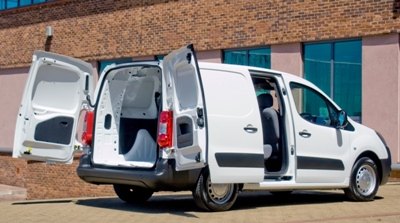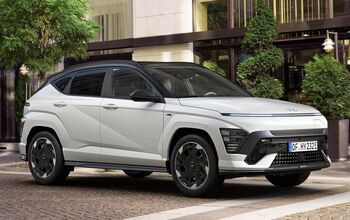PSA To Make Plug-In Van, Mitsubishi To Deliver The Goods

It’s no secret that I’m a bit doubtful about the runaway success of the all-electric vehicle. The infrastructure obstacles are just too great. There is one market where plug-ins make sense: Light delivery vehicles. Never cruise too far from the warehouse. Can be charged while van is being loaded. Lots of regenerative braking. Mitsubishi and PSA think the same. They will co-develop a compact commercial electric vehicle for the European market. Production will begin by 2012, says The Nikkei [sub].
The van will be manufactured under the Peugeot and Citroen brands and sold throughout Europe. Target markets are postal firms, freight companies, government agencies, etc. The van should sell for less than €20,000 after government subsidies.
The new electric vehicle won’t take much h design work: The body will be based on PSA existing light commercial vehicles. The van will be built at PSA’s Vigo plant in Spain. Mitsubishi Motors will build an assembly line using technology developed when building other electric vehicles, such as the i-MiEV.
Speaking of which, an i-MiEV will become available this coming October with a French badge.

Bertel Schmitt comes back to journalism after taking a 35 year break in advertising and marketing. He ran and owned advertising agencies in Duesseldorf, Germany, and New York City. Volkswagen A.G. was Bertel's most important corporate account. Schmitt's advertising and marketing career touched many corners of the industry with a special focus on automotive products and services. Since 2004, he lives in Japan and China with his wife <a href="http://www.tomokoandbertel.com"> Tomoko </a>. Bertel Schmitt is a founding board member of the <a href="http://www.offshoresuperseries.com"> Offshore Super Series </a>, an American offshore powerboat racing organization. He is co-owner of the racing team Typhoon.
More by Bertel Schmitt


































Comments
Join the conversation
Hybrids make sense in this application, too. UPS has already deployed them in several U.S. cities, although I see conflicting reports as to whether they're diesel-electric or diesel-hydraulic.
Having driven postal vehicles for some years a long time ago, I can tell you that delivery vehicles live a hard life by nature of their work and from (some of) the people who drive them. It would seem that the relative simplicity of electric vehicles might work in their favor: easy "start" on cold mornings, near-instantaneous windshield de-icing (one would think with all that juice available), and no transmission to abuse.
It'll face tough competition from the Ford Transit Connect EV.
Was up at Road America for the ALMS race a few weeks back, and a company called e-Star is starting to push their new electric delivery vans pretty hard. Good looking vans, they claim a 100 mile range with a 4-ton capacity.